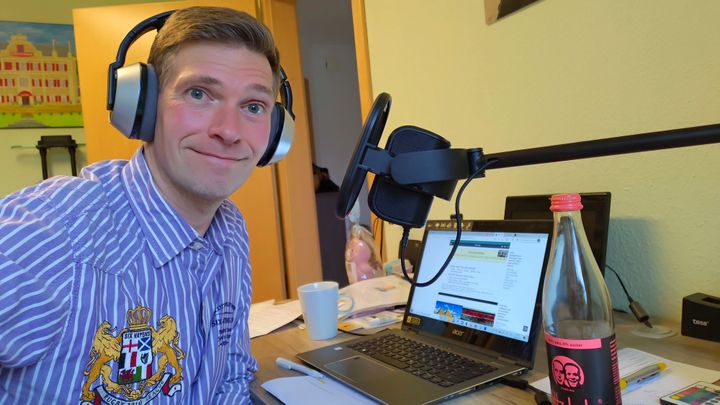Hate speech: Danes are harsher against Muslims online than Germans

Facebook's algorithms removed 27 million hate messages in the last three months of 2020 alone. Artificial intelligence is a smart and fast way to eliminate inflamed debates and utterances, but it is far from an infallible method. So says Olivier Niebuhr, who is an associate professor at the Center for Industrial Electronics at the University of Southern Denmark in Sønderborg.
- Digital algorithms can spot hateful comments on Facebook and other social media, but the algorithms often focus only on specific keywords, and they do not have the recipient in mind. Who receives the message? Is it a lawyer? An older or younger person? And is he/she in the company of others while the message is being read? Those types of factors have a huge impact on the extent to which a hateful utterance affects us. Therefore, we have researched hate speech based on cultural and contextual differences, so that it eventually becomes possible to design systems that make more informed and better decisions, he says.
What is hate speech
A report prepared by the Department of Human Rights in 2017 defined hateful messages as “Stigmatizing, derogatory, abusive, harassing and threatening statements made publicly against an individual or group based on the individual's or group's gender, ethnicity, religion, disability, sexual orientation, age, political observance or social status. "
- But the problem is that we perceive these things differently, says the researcher.
Oliver Niebuhr's research shows that there is a big difference in what we perceive as “a linguistic attack” depending on where we come from to what education and job we have - for example, there is a difference in what Danes and Germans perceive as strongly stigmatizing, offensive, derogatory or threatening.
- If we look at the senders, then Germans have a great fear of being touched with topics such as Muslims and not least the Holocaust. When it comes to these issues, Danes do not hold back in the same way.
Oliver Niebuhr goes on to say that his research, on the other hand, shows that when it comes to 'foreigners' in general, the Germans are less reticent about the assessment of how harsh one can express oneself.
- We have also found other cultural differences concerning what Danes and Germans emphasize with their definition of what are hateful messages and what are not. It is quite bad for Danes to compare people with an animal, e.g., to say, "He's a big pig!" The Germans do not quite have the restraint to do so. At least a slight restraint compared to Danes.
Cultural differences are important to keep in mind
Oliver Niebuhr believes that it is essential to not only focus on specific keywords when it comes to defining hate speech but just as much on the recipient.
- It is important to analyze the inner voice. It is impossible to read a text without the melody of the sentence playing in your head. And that melody - or inner voice - makes a huge difference.
The SDU researcher explains that the inner voice can transform something that immediately seems to be a hateful utterance into something completely different. It's about emphasis. If you read a text ironically or sarcastically, then it takes the sting out of the worst and the recipient perceives it as less offensive, derogatory or threatening.
- If we want to give policymakers guidelines to define what is hate speech and what is not, then we cannot ignore factors such as the melody of the sentence and the inner voice.
My Hips Don’t Lie. Physiological signals tell the truth
In connection with their study, the research team measured the participants' physiological reactions when they read hate speech.
As the first in the world, researchers monitored how brain waves and breathing patterns change when subjects read out a hateful message. Do the hands get sweaty, the heart rate rise and the pupils dilate?
- It is interesting because we can see that there is a difference between what people say and how their body reacts.
Oliver Niebuhr says that the researchers found a coalition between what came out of the subjects' mouths and what their bodies told in connection with specific sentence structures.
- It made a special difference in connection with what we have chosen to call 'indirect hate speech'. It could be a sentence that begins "I have nothing against Muslims, but ……". It is politically correct to regard sentences like these as being bad, and people also say that this is the case, but they do not respond as strongly to them physiologically as their explicit ratings would suggest.
The researcher, therefore, believes that it makes sense to look at the physiological signals, as they are direct indications that are not subject to a social filter.
- I estimate that it is a more accurate answer you get.
Hoping for a future spared of hatred on social media
The goal of the research is to assist policymakers and social media to combat hate speech online.
- The conclusion is that it is simply not enough to look at specific keywords. It does not provide an adequate evaluation. You will need to look at the recipient and the context.
Oliver Niebuhr and his research are part of the Danish / German XPEROHS project, which is supported by the Villum Foundation. Some of the project's partners advise German decision-makers on hate speech. You can read more about the project and Oliver Niebuhr's research here.
Kontakter
Oliver Niebuhr
Associate Professor of Communication & Innovation
Founder of AllGoodSpeakers ApS
Head of the CIE Acoustics Lab
CIE - Centre for Industrial Electronics
Tel. +45 6550 7649
Mobil +49 1577 475 333 2
Email olni@sdu.dk
Web http://physics.sdu.dk/people/olni
Address: Dept. of Mechanical and Electrical Engineering, Alsion 2, DK-6400 Sønderborg, Denmark
Billeder
Information om Syddansk Universitet
Følg pressemeddelelser fra Syddansk Universitet
Skriv dig op her, og modtag pressemeddelelser på e-mail. Indtast din e-mail, klik på abonner, og følg instruktionerne i den udsendte e-mail.
Flere pressemeddelelser fra Syddansk Universitet
Yousif Subhi udnævnt til professor i øjensygdomme ved SDU19.12.2025 11:26:25 CET | Pressemeddelelse
Professoratet skal styrke forskningen i patientnære løsninger og ny teknologi til behandling af nethindesygdomme og bidrage til udvikling, kvalitet og ny viden på området.
SDU vil styrke fremtidens sundhedsvæsen med ny kandidatuddannelse i sundhedsøkonomi19.12.2025 10:07:21 CET | Pressemeddelelse
Syddansk Universitet vil fra sommeren 2026 udbyde en ny kandidatuddannelse i sundhedsøkonomi. Uddannelsen skal imødekomme et voksende behov for specialiseret viden om økonomi i sundheds- og velfærdsområdet.
Benjamin S. B. Rasmussen udnævnt til professor i radiologi og medicinsk teknologi ved SDU15.12.2025 14:03:46 CET | Pressemeddelelse
Professoratet skal styrke forskningen i medicinsk teknologi og bidrage til udvikling, kvalitet og ny viden på området.
194.000 har fortalt om bevægelsesvaner11.12.2025 10:32:04 CET | Pressemeddelelse
Danmark i Bevægelse har nu et unikt datamateriale, som kan bruges til at skabe bedre rammer for et aktivt liv for børn og voksne.
ERC-millioner til professor Rafsanjani: Slangerobot skal lytte sig frem i ukendt terræn9.12.2025 12:10:30 CET | Pressemeddelelse
Professor Ahmad Rafsanjani har netop modtaget en prestigefuld ERC-bevilling på 15 millioner kroner. Hans projekt vil lære bløde robotter at navigere ved hjælp af lyd, friktion og origami-teknik – en evne, der kan åbne døre til både sammenstyrtede bygninger og fjerne planeter.
I vores nyhedsrum kan du læse alle vores pressemeddelelser, tilgå materiale i form af billeder og dokumenter samt finde vores kontaktoplysninger.
Besøg vores nyhedsrum

